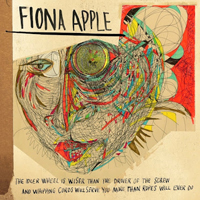 Fiona Apple: The Idler Wheel… (Epic)
Fiona Apple: The Idler Wheel… (Epic)
With a penchant for varying her production style at each stage of her career, Fiona Apple once again sets out for new sonic terrain on her fourth album, The Idler Wheel. A partial return to the acoustic-based instrumentation of her 1996 debut, Tidal, Apple’s new material nonetheless rarely revisits that album’s courtly brand of jazz pop. Instead, The Idler Wheel veers much closer to what Apple might sound like if she landed somewhere between modern experimental theater, the unabashed pomp of Broadway, and the bustle of a frontier saloon or Prohibition-era speakeasy.
At first, it’s easy to get the impression that Apple has made a skeletal, bare-bones album when in fact the music teems with sound. A dizzying array of percussion, for example, conjures everything from knee slapping to a clanging boiler room to the tympanic rush of a WWII big band. Standup bass (courtesy of former Soul Coughing bassist Sebastian Steinberg), spectral guitar lines, music box, banjo, bouzouki, scratchy violin/cello bowing, and even screaming children all play small, discreet roles within a creaking, groaning world of sounds. Some of the instruments whisper as if they’re barely being touched, which entices the ear with tiny details to feast on over repeated listens.
At the center of it all, Apple’s piano playing retains its distinctive elegance but, this time, sounds like it’s giving off dust as it leaves soft echoes lingering in the air. Apple deserves no small measure of the credit for these nuances herself, as she self-produced the music together with drummer/multi-instrumentalist Charley Drayton (Keith Richards, Paul Simon, Divinyls, The Cult, Herbie Hancock). She and Drayton (credited as “Feedy” and “Seedy”) also play the lion’s share of the instruments and supply most of the sounds themselves. Not to be overlooked, recording engineer John Would and mixer Dave Way both contribute mightily to the finesse and precision of the sonic balance. Finally, Apple’s theatrical vocal delivery acts as a buffer so that she inhabits, rather than overwhelms, the music.
But it’s not for lack of trying.
Though there are several instances on the album where Apple creates the illusion that she means to be jovial and upbeat, she’s still hovering around the same lyrical concerns that have preoccupied her since her career began — namely, romantic turmoil and self-flagellation. For all the self-referencing she does, Apple sounds no more self-aware or at peace today than she did as a teenager sixteen years ago. Not once on this album does she try to imagine the experience of anyone other than herself (except, of course, to consider how they feel towards her). As much as her music continues to advance, she sounds stunted lyrically.
Excessive self-consciousness may be a byproduct of being thrust into the public eye at the age of 18, but by talking about herself so much, Apple actually makes it harder to relate to her point of view. As a result, lines like “every single night’s a fight with my brain” have less use for listeners who struggle with the same experience. Apple crossed the line between reflection and wallowing long ago, and, if The Idler Wheel is any indication, she’s still comfortable wallowing.
Several times throughout, she unexpectedly forces her voice into a mangled cry that, in pure musical terms, comes across as a brave decision and forces the listener to think about the music from a more confrontational perspective. But, having harped on her inner agony so much already, Apple wastes an opportunity to engage the audience, and the end result falls closer to gore than compelling drama.
Still, because Apple’s vocal phrasing often keeps her self-absorption in check, it frees the listener to go about the business of being moved, uplifted, and — where appropriate — provoked by The Idler Wheel’s almost bottomless well of musical information. Of course, her prodigious chops and imagination also go a long way, to say nothing of the authoritative strides she takes as she continues to venture into new modes of working with sound. Ultimately, the fact that The Idler Wheel doesn’t sink under the weight of her fixations qualifies it as a triumph.


“…mixer Dave Way…contribute[s] mightily to the finesse and precision of the sonic balance.” Yeah!